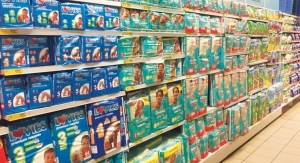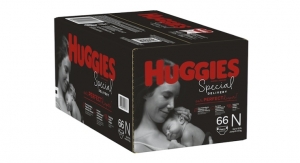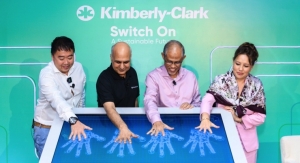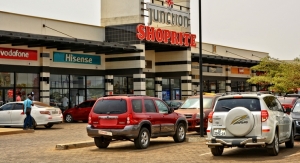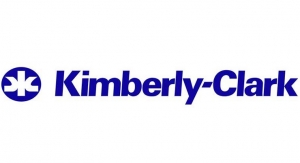09.19.19
Hygiene products leader Kimberly-Clark outlined plans to drive marketshare performance at the latest Barclay’s Investors' conference in Boston, MA last month. CEO Michael Hsu and CFO Maria Henry reported an update on K-C Strategy 2022, the company’s mid-term strategic plan to drive growth and improve shareholder performance.
According to Hsu, K-C Strategy 2022 aims to drive impact in five areas—social, forest and fiber, waste and recycling, energy and climate and supply chain.
Hsu introduced this strategy not long after becoming CEO in 2018. “The plan will allow us to create balanced and sustainable growth and create shareholder value in a challenging environment,” he says.
So far in 2018, organic sales have grown thanks to higher selling progress and product innovations, allowing the company to increase its yearly forecast. “While we are pleased with this improvement, we are not satisfied,” Hsu says.
Future growth will be achieved by focusing on the top tier of its consumer categories. In the diaper market, the difference between the bottom and top tiers of the market is not as high—only about three times—as in other consumer categories, but new technology is allowing the company to fetch more than the industry average—20 cents per diaper—for many of its Huggies products.
K-C’s most recent launch, Huggies Special Delivery, an ultra-premium, plant-based diaper product is priced 40% higher than K-C’s other Huggies premium product offerings, showing how innovation can still drive growth in the category. According to Hsu, it is comprised of Huggies’ best technologies from around the world, featuring plant-based ingredients, softness and the ultimate in comfort.
Meanwhile in adult care, where K-C is the market leader with more than a 50% marketshare, Hsu views the company’s role in the under penetrated adult incontinence segment as a leader in category development.
In the past few months, K-C has made two new products launches—Depend Active and Poise Flex—in the category. Both have accelerated fit and comfort and opened up new users to the category. “We are reducing stigma of the conditions. Show how Poise and Depend can help our users continue to enjoy active lifestyles.”
Beyond product innovation, Hsu pointed at strong opportunities in developing and emerging markets as a key growth driver for K-C moving forward. Currently, these markets account for just 30% of K-C’s global sales but this figure is significantly higher than it was five years ago.
“We have had historical success but we are still in the early innings of development,” he says. “Penetration is low because our products are used several times per day so they require a moderate household income to participate.”
If India, Africa and China reach the spending levels of U.S. consumers, the market could see as much as $100 million in additional revenues. While it will undoubtedly take many years for these markets to reach this level of spending power, K-C is many consumers’ core needs.
In China, the company has returned to profitabltiy after a challenging period with the development of Huggies No. 5, a sophisticated product—featuring fit and softness—to appeal to the sophisticated Chinese consumer. K-C is now rolling out similar technology to mid-tier products in China.
Outside of China, K-C has been focusing on expanding the scope of its products launching products that have already been successful in China into countries like Malaysia, Thailand, Singapore, The Phillipines and Vietnam.
“Vietnam is leading innovation across the value spectrum - in both open diaper sand diaper pants. Our team is doing a great job of taking best innovation from lead markets like China and Korea and rapidly rolling them out across the region," Hsu says.
In Singapore, K-C has focused on investment, adding capacity for for baby wipes and creating a dedicated formulation lab to boost product innovation in Tuas, Singapore. The Tuas site exports to markets across the Asia-Pacific including Australia, New Zealand, Taiwan, China and multiple ASEAN countries. It was first opened in 1981. The investment brought the site’s baby wipes capacity from 2.4 million to about 5 million per year, according to reports.
Meanwhile, in another important growth region, Africa, K-C announced plans to close its factory in Lagos, Nigeria, later this year to build a new factory in its place. The decision to build a new factory with enhanced technology and capabilities was driven by strong growth in demand for its products in the region. About 60 permanent employees will be affected by the closure. However, the company insists it remains committed to the Nigerian market where it will expand its team and open an additional office this year.
According to Hsu, K-C Strategy 2022 aims to drive impact in five areas—social, forest and fiber, waste and recycling, energy and climate and supply chain.
Hsu introduced this strategy not long after becoming CEO in 2018. “The plan will allow us to create balanced and sustainable growth and create shareholder value in a challenging environment,” he says.
So far in 2018, organic sales have grown thanks to higher selling progress and product innovations, allowing the company to increase its yearly forecast. “While we are pleased with this improvement, we are not satisfied,” Hsu says.
Future growth will be achieved by focusing on the top tier of its consumer categories. In the diaper market, the difference between the bottom and top tiers of the market is not as high—only about three times—as in other consumer categories, but new technology is allowing the company to fetch more than the industry average—20 cents per diaper—for many of its Huggies products.
K-C’s most recent launch, Huggies Special Delivery, an ultra-premium, plant-based diaper product is priced 40% higher than K-C’s other Huggies premium product offerings, showing how innovation can still drive growth in the category. According to Hsu, it is comprised of Huggies’ best technologies from around the world, featuring plant-based ingredients, softness and the ultimate in comfort.
Meanwhile in adult care, where K-C is the market leader with more than a 50% marketshare, Hsu views the company’s role in the under penetrated adult incontinence segment as a leader in category development.
In the past few months, K-C has made two new products launches—Depend Active and Poise Flex—in the category. Both have accelerated fit and comfort and opened up new users to the category. “We are reducing stigma of the conditions. Show how Poise and Depend can help our users continue to enjoy active lifestyles.”
Beyond product innovation, Hsu pointed at strong opportunities in developing and emerging markets as a key growth driver for K-C moving forward. Currently, these markets account for just 30% of K-C’s global sales but this figure is significantly higher than it was five years ago.
“We have had historical success but we are still in the early innings of development,” he says. “Penetration is low because our products are used several times per day so they require a moderate household income to participate.”
If India, Africa and China reach the spending levels of U.S. consumers, the market could see as much as $100 million in additional revenues. While it will undoubtedly take many years for these markets to reach this level of spending power, K-C is many consumers’ core needs.
In China, the company has returned to profitabltiy after a challenging period with the development of Huggies No. 5, a sophisticated product—featuring fit and softness—to appeal to the sophisticated Chinese consumer. K-C is now rolling out similar technology to mid-tier products in China.
Outside of China, K-C has been focusing on expanding the scope of its products launching products that have already been successful in China into countries like Malaysia, Thailand, Singapore, The Phillipines and Vietnam.
“Vietnam is leading innovation across the value spectrum - in both open diaper sand diaper pants. Our team is doing a great job of taking best innovation from lead markets like China and Korea and rapidly rolling them out across the region," Hsu says.
In Singapore, K-C has focused on investment, adding capacity for for baby wipes and creating a dedicated formulation lab to boost product innovation in Tuas, Singapore. The Tuas site exports to markets across the Asia-Pacific including Australia, New Zealand, Taiwan, China and multiple ASEAN countries. It was first opened in 1981. The investment brought the site’s baby wipes capacity from 2.4 million to about 5 million per year, according to reports.
Meanwhile, in another important growth region, Africa, K-C announced plans to close its factory in Lagos, Nigeria, later this year to build a new factory in its place. The decision to build a new factory with enhanced technology and capabilities was driven by strong growth in demand for its products in the region. About 60 permanent employees will be affected by the closure. However, the company insists it remains committed to the Nigerian market where it will expand its team and open an additional office this year.


